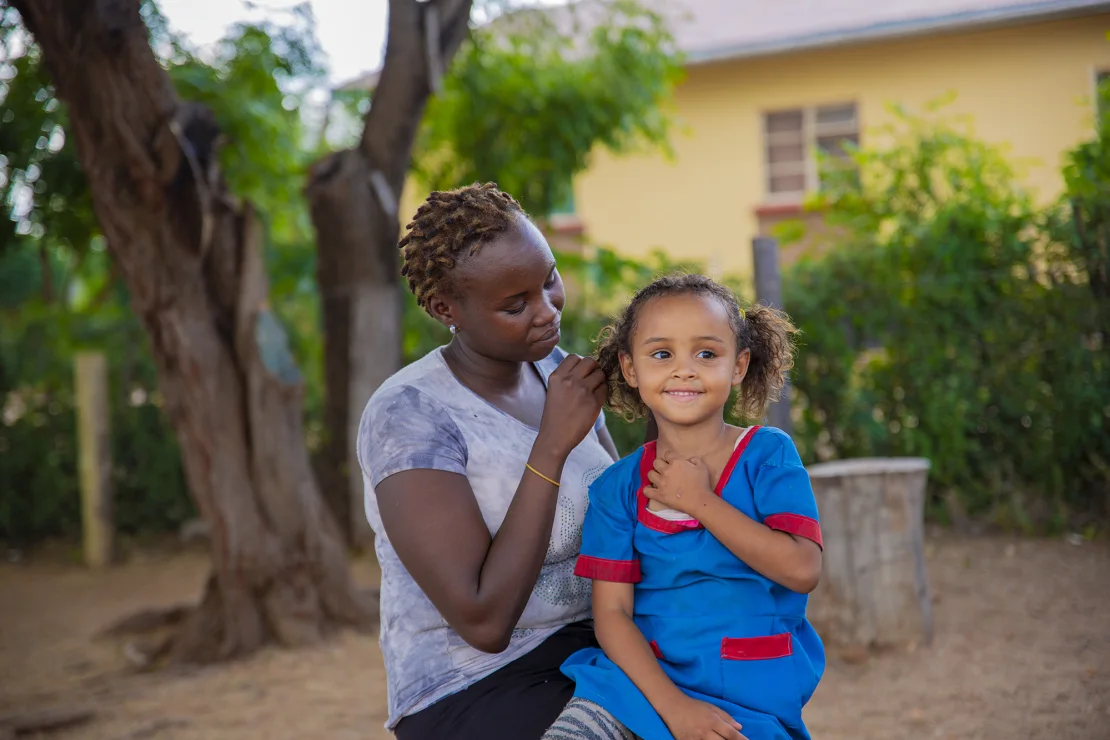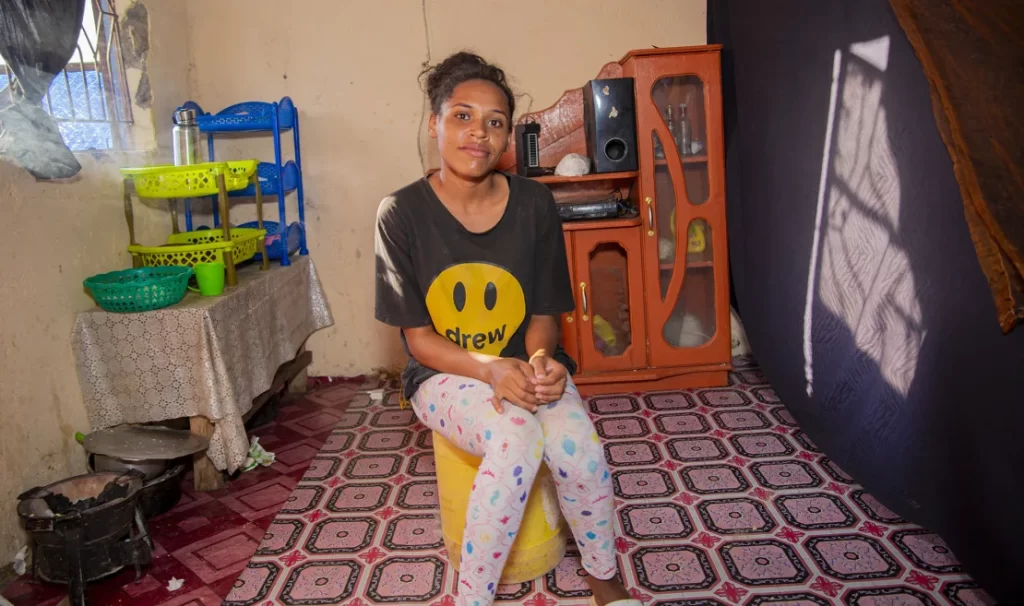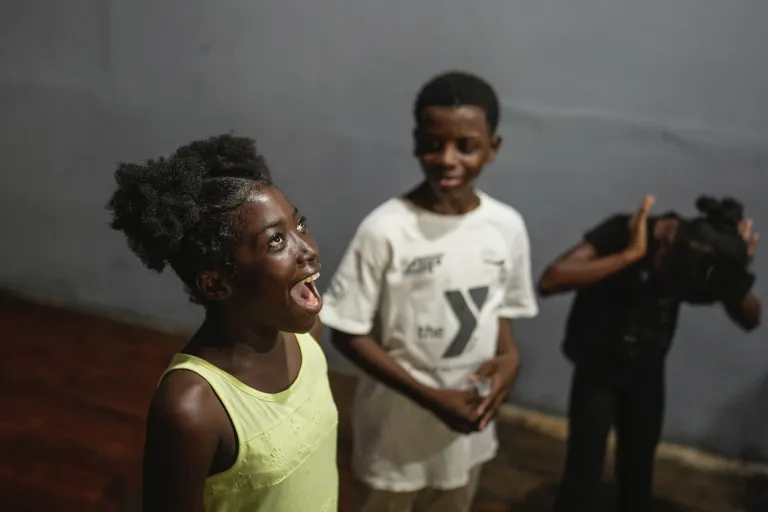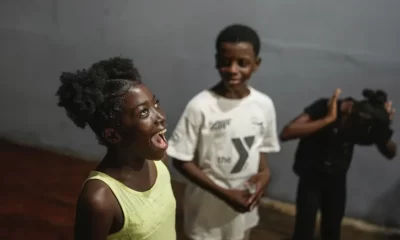International
The British Army trains in Kenya. Many women say soldiers raped them and abandoned children they fathered

Seventeen-year-old Marian Pannalossy cuts a striking figure wherever she goes in Archer’s Post, a small town 200 miles north of Nairobi. She lives alone and is light-skinned in a place where mixed-race people are a rarity and therefore ostracized.
“They call me ‘mzungu maskini,’ or a poor white girl,” she told CNN at her single-room house, a tremor in her voice. “They always say ‘Why are you here? Just look for connections so that you can go to your own people. You don’t belong here. You’re not supposed to be here suffering.’”
Marian believes that her father was a British soldier, but she has never met him. She does not even know his name.

Marian Pannalossy pictured at her home. Festo Lang/CNN
Marian is among a group of mixed-race children whose mothers say they were conceived after rape by British soldiers training in Kenya. Her mother, Lydia Juma, was among hundreds of Kenyan women who filed complaints with the UK military over the years, as documented by Kenya’s human rights body.
“I don’t know why God is punishing me. I don’t understand,” Juma said through tears in a powerful 2011 documentary, ‘The Rape of the Samburu Women.’
Marian, aged four at the time, sat on her lap, sometimes hugging her mother as she wept and recounted how she was violated and the suffering she had endured since.
To read this article in its entirety, visit CNN
International
Nigeria’s First Lady warns young women against ‘nakedness’ in fashion after Meghan Markle’s visit
Nigeria’s First Lady calls out “nakedness” in fashion after Meghan Markle’s recent visit where she was criticized for revealing clothing.

Nigeria’s First Lady is taking a stand against any “nakedness” in local fashion, following Meghan Markle’s recent visit to the country where she was criticized for her revealing ensembles.
Senator Oluremi Tinubu, wife of President Bola Tinubu, addressed the West African nation during the first anniversary of her husband’s administration and took aim at the scantily clad fashions being popularized by American stars. Tinubu focused her speech on Nigeria’s young women to encourage them not to emulate what they see coming out of the Western world, The New York Post reported.
“We have to salvage our children,” she declared. “We see the way they dress. We are not having the Met Gala. And everyone, the nakedness, is just everywhere and the men are well-clothed.”
“Tell them we don’t accept nakedness in our culture. That is not beautiful at all, ” Tinubu added.
While the First Lady didn’t publicly criticize the Duchess of Sussex’s fashion choices while in Nigeria, she did reference her visit as a way to instill pride in Nigerian women and their ability to influence style.
“Why did Meghan come here looking for Africa? That is something we have to take home with [us]. We know who we are. Don’t lose who you are,” Tinubu said.
“They’re all beautiful girls, but they should be confident in who they are. We are fashionable, we see what is going on.”
Tinubu ended with a call to action urging elder Nigerian women to bring their families and local communities together to ensure the prosperity of their nation.
“When mothers stand with you, the house is in order,” she said. “Looking ahead, we must endeavor to become the unifying force in our homes and our communities, to bring about greater prosperity for our nation.”
Prince Harry and Meghan Markle were in Nigeria for three days earlier this month to promote the tenth anniversary of the Invictus Games. While there, Markle shared her roots in the country following a DNA test that revealed she is 43% Nigerian.
During their visit, Markle was criticized by the media for the expensive and revealing clothes she wore at public events with some calling out her outfits that “bared too much skin” or needed “more modesty.” Some claimed she wouldn’t have shown so much skin if Buckingham Palace had organized the events.
International
Forced to rebuild a life at 12, a Haitian girl joins thousands seeking an escape from gang violence
Haiti is as fragile as it’s ever been: Nearly 2 million people are on the verge of starvation, more than 360,000 have been left homeless by gang invasions, and basic supplies dwindled as the main seaport and international airport closed for months.

PORT-AU-PRINCE, Haiti (AP) — For 12-year-old Juliana St. Vil, life begins every afternoon.
She bounds out of the crowded shelter where she’s been sleeping on the concrete floor for 10 months, a smile on her face despite harsh surroundings. Not yet a teenager, Juliana must navigate a Haiti oppressed by gangs that killed her father and drove her family out of their home.
An acting workshop held daily in a big house with a leafy yard is her escape.
“I lived well,” Juliana said, remembering her old neighborhood. “I could always eat when I was hungry. I could go to school without a worry.”
Millions across Haiti are struggling to rebuild their lives in a country with no president as gangs who want full control of the capital and beyond kill, rape and injure thousands.

(AP Photo/Ramon Espinosa)
The country of more than 11 million people finds itself at a crossroads while preparing for the arrival of thousands of police from Kenya and other countries. The officers are part of a U.N-backed deployment to quell gang violence that exploded after the July 2021 presidential assassination.
Haiti is as fragile as it’s ever been: Nearly 2 million people are on the verge of starvation, more than 360,000 have been left homeless by gang invasions, and basic supplies dwindled as the main seaport and international airport closed for months.
Caught in the middle are Haitians of every generation wondering if the country will pull through, and whether they will live to see its future.
‘We had a good life’
Juliana lived most of her life in Carrefour-Feuilles, which rebuilt itself after the devastating 2010 earthquake, and was known as a birthplace of young artists.
Located in southern Port-au-Prince, it was home to working-class people and those who had left the rural countryside.
“When we were at home, we were free, we had a good life,” Juliana’s mother, Baby Gustave, recalled.
They lived in a community called Savane-Pistache, where she met her future husband at a daily prayer group.
“I loved everything about him. He bathed me, cooked for me and went to the market for me,” Gustave said, explaining that she suffers from debilitating asthma attacks.
By the time Juliana was born in 2011, gangs already were fighting to control more territory in Carrefour-Feuilles, hacking at each other with machetes they later replaced with high-caliber weapons, targeting rival gunmen and civilians.
One time, the gunfire was so heavy that Juliana said she fainted at home.
“I have a little heart problem. And when I hear gunshots, I think that I might get shot,” she said in a quiet voice.
Gustave decided it was time to leave. Her partner had been shot dead in 2013 as he walked home after a full day’s work at a factory.
On a Sunday afternoon in August 2023, Gustave fled home with Juliana and a younger daughter she shares with her new partner. Like many running from gang violence, all she took was their birth certificates and her voting card.
Now, a fight simply to survive
Juliana cried when they left. It was the first time she had been uprooted, and she didn’t like it. At Savane-Pistache, she would play outside with her friends and lived in a two-bedroom home with beds and mattresses and an outdoor bathroom she didn’t have to share with strangers.
Now, she sleeps on the concrete floor of a school converted into a shelter, living in a classroom with nearly a dozen strangers, her clothes stuffed into a suitcase and a big plastic bag that once contained rice. She shares a handful of bathrooms with more than 2,200 people. There’s not much room to play because adults, drying clothes and boiling cauldrons filled with soup and rice take up nearly all the space at the shelter, where food is sometimes scarce.
On a recent morning, Gustave boiled bread and added a chunk of butter, stirring continuously until it formed a thick soup. In the background, a radio blared news, with one man declaring, “Haiti is crashing.”
Gustave spoon fed the soup to her 3-year-old and set aside leftovers for a thin neighbor who lived with them. Juliana had already eaten breakfast at a friend’s house, where she spent the night because she does not get along with her mother’s new partner.

(AP Photo/Ramon Espinosa)
By 1 p.m., Juliana was hungry, and she dove into the free meal that she and nearly a dozen other children get daily before the acting workshop. Like others, she ate only half and saved the rest for her family.
Eager to get started, the kids filed barefoot into a room with wooden floors to practice a skit they will present to the public at the end of the two-week workshop. While it doesn’t yet have a title, the skit focuses on life at a shelter in Haiti.
Juliana is one of the lead actresses. In one scene, she’s a mother seeking permission to live at a shelter with her son, played by a young boy who pretends to cry but most times ends up giggling, making the entire group laugh. In another scene, she’s a peacemaker, finding a solution to children fighting because they want to play different games in a crowded shelter.
In one final scene, she reveals her name and her real-life dream: to become a policewoman.
“I like the way they dress, but I would be afraid of dying,” she said.
Just a few blocks away from where Juliana and others rehearse, a female officer with Haiti’s National Police was fatally shot May 8 as she fought off gang members trying to kidnap her. She was dropping off her child at school.
A distraction from the trauma
To build trust, the children in the workshop called “Theater Curbs Violence” organized by BIT-HAÏTI, a street theater group, practice falling backward into someone’s arms.
Not all can do it. Some bend backward only slightly, as if warming up for a limbo dance. A handful stand still, waiting for the next exercise.
It involves forming a circle and yelling one at a time. One girl shouts for only a second and then covers her face in embarrassment.
“They have trauma,” said Stéphanie François, who helps lead the workshop.
The children have been forced to flee their homes and are exposed to grisly gang violence blamed for more than 2,500 deaths or injuries from January to March alone.
Hundreds of schools have closed, and playtime at crowded and unsanitary shelters is rare.
“They have a need to leave behind the environment of the camp to be together, to tease each other,” said Eliézer Guerisme, program director at Haiti’s National Theater, who is involved in the workshop.
Juliana misses school. She relishes math classes, especially division. In her free time, when she’s not helping her mother wash clothes or dishes or take care of her sister, she watches cooking shows, enthralled by the process of baking cookies and cakes.
But being in that big house with the leafy yard is the one thing that helps take her mind off being homeless, off leaving her friends and her school, off the violence.
It’s an escape few Haitians have.
On a recent afternoon, Juliana and the other children gathered to practice a scene where they speak in unison while living at a pretend shelter: “Even if it’s not what we want today, one day everything will be perfect,” they said in clear and strong voices.
-

 International4 months ago
International4 months agoForced to rebuild a life at 12, a Haitian girl joins thousands seeking an escape from gang violence
-

 Opinion4 months ago
Opinion4 months agoUnlike Other Badly Behaved Black Celebrities, Diddy’s Shot at Redemption Is Nearly Impossible
-

 The Culture3 months ago
The Culture3 months agoChicago teen who entered college at 10 earns doctorate at 17
-

 Business3 months ago
Business3 months agoHow Uncle Nearest Founder Fawn Weaver Built A Billion-Dollar Whiskey Business
-

 Entertainment4 months ago
Entertainment4 months agoBiggie’s Mom, Voletta Wallace, wants to ‘slap the daylights out of Sean Combs’
-

 Politics3 months ago
Politics3 months agoJudge Aileen Cannon rips up court schedule in Mar-a-Lago case in ways that benefit Trump
-

 Entertainment3 months ago
Entertainment3 months agoTrial in the fatal daytime ambush of rapper Young Dolph reset to September
-

 Crime3 months ago
Crime3 months agoBus passengers frantically texted loved ones as gunman hijacked an Atlanta commuter bus during rush hour





